Movie Review – Flags Of Our Fathers
Solid, aloof re-enactment of the battle of Iwo Jima told through the tough, no-nonsense approach of Clint Eastwood. Cast are all excellent, effects and cinematography are superb, but the script lacks an emotional center and drifts into too many characters’ memories to make a sustainably interesting narrative. The battles sequences are well mounted, and the production of the film is exemplary, it’s just that at the end of the day, I just didn’t feel the weight of this story as I guess I was supposed to.
– Summary –
Director : Clint Eastwood
Year Of Release : 2006
Principal Cast : Ryan Phillipe, Jesse Bradford, Adam Beach, Barry Pepper, Jamie Bell, Paul Walker, Robert Patrick, Harve Presnell, Melanie Lynskey, John Slattery.
Awards : Academy Award Nominations – Best Sound & Sound Editing.
Approx Running Time : 127 Minutes
Synopsis: Three soldiers return to America after fighting on Iwo Jima during World War II, after their picture is taken raising a flag upon the top of Mount Suribachi, to help promote the war effort and raise funds for a bankrupted Government. As they tour the country, they remember the events that led them to this point.
What we think : Solid, aloof re-enactment of the battle of Iwo Jima told through the tough, no-nonsense approach of Clint Eastwood. Cast are all excellent, effects and cinematography are superb, but the script lacks an emotional center and drifts into too many characters’ memories to make a sustainably interesting narrative. The battles sequences are well mounted, and the production of the film is exemplary, it’s just that at the end of the day, I just didn’t feel the weight of this story as I guess I was supposed to.
*********************
The effects of war have been a staple of the genre in film since it’s inception, practically; from looking at the emotional and mental havoc it wreaks on people, to the social and political ramifications of war on a larger scale – almost any war film you care to mention will touch on the dehumanization effect war has at some point. Clint Eastwood’s foray into war film-making attempts to capture the dichotomy of the “War Hero” returning home, with three of the solders who raised the American flag atop Mt Subiyachi on Iwo Jima during World War II returning home as heroes to spruik for money from the public, to fund the ongoing war in the Pacific. Flags Of Our Fathers takes place in flashback form, with the “battle sequences” occurring in the minds eye of our three main characters. It’s a film asking the question of the value of having returning solders idolized as heroes for the sake of the public image – and what effect this has on those very same men.
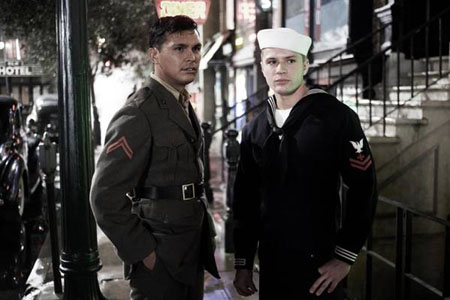
The photos and figures coming out of the Pacific Theater of WWII weren’t good for the Americans, at least until a single image catapulted the solders struggle to the forefront of the national consciousness. With the government drowning in debt, and many funding drives being done across the country, the military needed a good-news story with which to approach people for money – the now-famous image of 6 soldiers raising the American flag above Iwo Jima proved to be just that. Of the six that appeared in the photo, three were killed in the weeks immediately following, meaning only three solders made it back to US soil for the inevitable press-junket to drum up some funding. As those three soldiers journey across America promoting the war effort, and recounting their heroic deeds, they begin to feel the guilt of having left their comrades behind, and of being alive when so many of their friends were being killed.
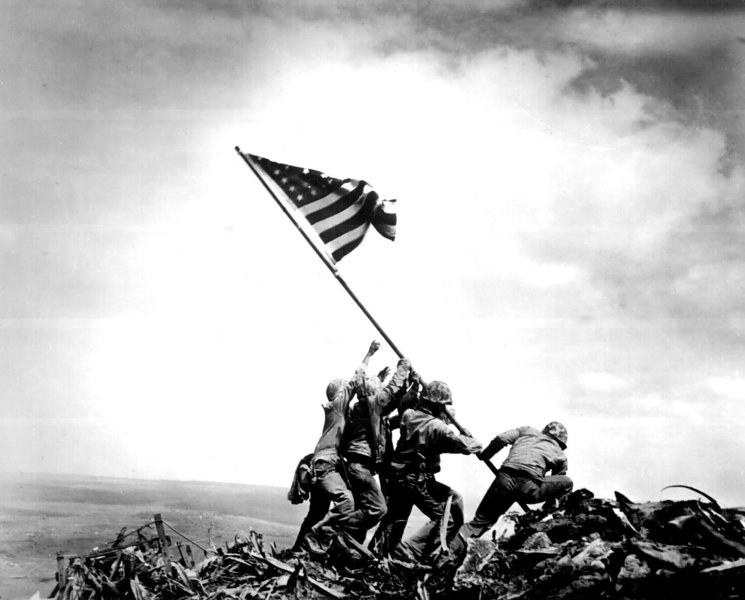
Clint Eastwood isn’t a filmmaker to shirk a challenge, and with Flags Of Our Fathers being filmed almost back-to-back with Letters From Iwo Jima, the second of his duo of war films set in the Pacific’s most iconic warground, he managed to tell the story of the island’s battle from both sides – the Americans and the Japanese. While I tend to agree with the majority of critics that Letters is probably the superior of the two (and rightly nominated for a Best Foreign Language Picture Oscar), Flags is still a worthwhile endeavor to enjoy and appreciate, even if there are some flaws. Told predominantly as remembrances of the trio of key soldiers, medic Jack Bradley (Ryan Phillipe), PFC Rene Gagnon (Jesse Bradford) and PFC IRa Hayes (Adam Beach), Flags Of Our Fathers is a sombre, languid retelling of the capture of Iwo Jima, with Eastwood’s simple, elegant film-craft allowing the characters – and the story – to mature and evolve naturally within its framework. The film’s depiction of the battle on Iwo, as well as the dramatization and narrative liberties of the people involved, are open to interpretation, but the thrust of the story remains pure – that war is hell, and it’s a damn good thing we finally figured out what Post Traumatic Stress is. Of note, the story arc involving Ira Hayes, who suffered PTS the worst of the three solders we follow, is both moving and frustratingly aloof. The human drama of Hayes’ descent into alcoholism, and his resentment of being unable to go back to his friends in the battlefield instead of scoffing at banquets and feeling guilt at being alive, is well scripted and well handled by Eastwood, but Adam Beach (who appeared as the lead character in John Woo’s befuddling Windtalkers) doesn’t have the ability to perform to the standard the script requires. I found Beach a little annoying, to be honest, with his silent glowers and alcoholic rages supplanting anything like actual character development. His story feels tacked on to the film in a strange way, almost as if Clint was trying to tell a different story within the film: Hayes’ story would make a fine film on its own, but his backstory here isn’t explained well enough to allow us to empathize as he slips into depression.
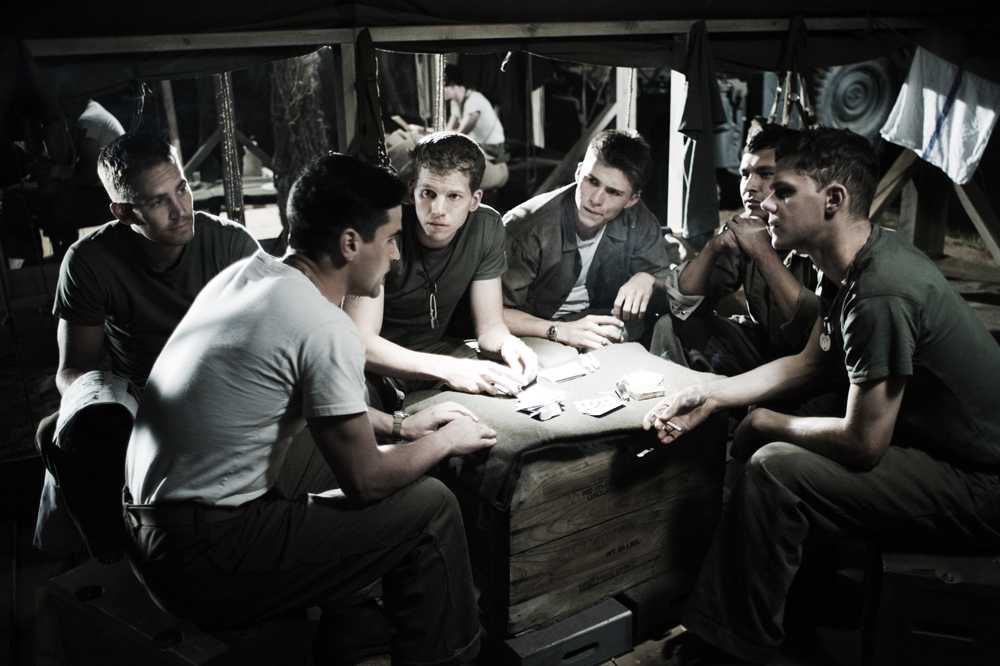
Bradley and Gagnon, meanwhile, seem to lap up the fame in the early stages, although Bradley feels guilt for the Defense Department’s handling of their situation – the official picture and names of the soldiers involved in the event it shows was erroneous at the time, and by the time anyone figured out that people were named in the photo who hadn’t been there it was too late. Gagnon lapses into the playboy lifestyle well, until a former flame arrives to marry him and take him off the market. As the film progresses, we see the beginnings of the work of people involved in “public relations”, that is, those who make sure the image portrayed to the media is one that’s asked for by the military. The rest of the cast are given, it must be said, fairly generic soldier characters to play. I don’t say this in an offhanded manner to slight the memory of those who died in this campaign, it’s just that Clint’s got so many characters to keep track of, and to tell the story of, that eventually these brave men seem to slip into the background as far as the narrative goes. As with the majority of war films, being that by nature they’re largely ensemble pieces, character development can only ever be limited at best – even Spielberg struggled with character development in Saving Private Ryan, so it’s a difficult thing to get right – here, I think Eastwood’s direction is a bit scattershot on the big stage.Top talent like Barry Pepper (appearing in what, his twentieth war film?), Jamie Bell, Robert Patrick and Neal McDonough are all reduced to war movie cliches, which is disappointing, but not unexpected.
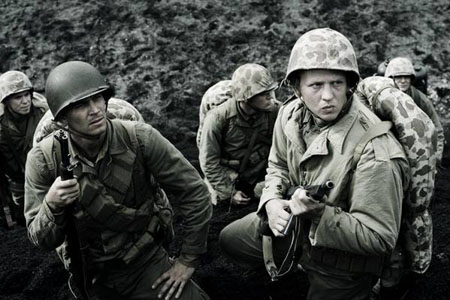
At times, Eastwood struggles to keep the films focus on track, occasionally diverging the central narrative to show us things that, perhaps, aren’t required for the film to work. The battle sequences, while I admire their production value, do start to drag a little by the end of the film, as the conquest of Iwo Jima comes to an end, and Eastwood seems content to throw another few explosions, ravaged corpses and slick digital effects at us to break up the “back in America” narrative. I also felt that the final twenty or so minutes of the film could have been tighter, as the ending of this seemed to go on much like the finale of Return of The King. It wasn’t as profoundly moving as I’d hoped it would be, even though you did feel as though you’d gone through a journey with these characters, but the emotional connection just wasn’t strong enough. This doesn’t make Flags of Our Fathers a bad film, it’s just that I think Clint got caught up in the patriotism of the film and didn’t want it to end, resulting in some ineffectual “closure” scenes to end with. The story behind the flag raising is indeed one that deserves to be told, and Eastwood brandishes his cinematic clout with the accomplished surety of a master film-maker (which he is, undeniably), but after high-water marks such as Million Dollar Baby, Mystic River, Unforgiven and In The Line Of Fire, Flags Of Our Fathers isn’t quite the emotional tear-jerker it wants to be. Mind you, even Clint’s not-so-great films are still better than a lot of the other stuff out there.
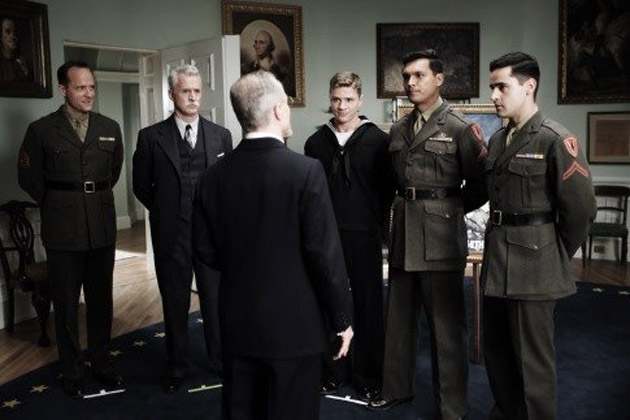
As a package with Letters From Iwo Jima (which shall be reviewed at a later date here at fernbyfilms.com) Flags Of Our Fathers is a testament to the participants in the Pacific Theater of WWII, on both sides. Neither film attempts to discuss the politics behind the war, rather they show us the effects of the consequences of going to war – the conflict and human sadness is both heartbreaking and infuriating: heartbreaking for the loss of so many young men doing as ordered to win a war, and infuriating for the governments and leaders who lead us to it. While not a patch on some of Eastwood’s earlier films, or even his more recent, Flags Of Our Fathers is worthwhile, evocative and at times, truly moving, but for the main it remains a cold, emotionally shallow affair with glimpses of awesome.


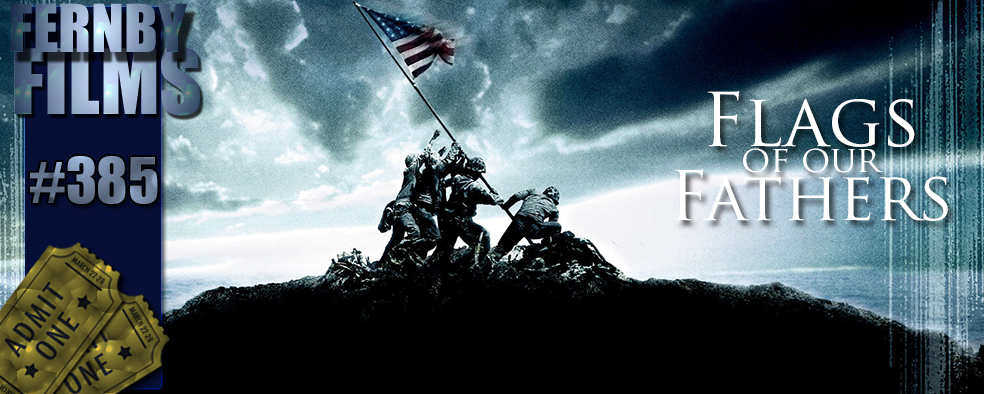
 Flags of Our Fathers (2006)
Flags of Our Fathers (2006)






I wasn’t a big fan of this movie myself. I felt the movie spent too much time outside of the battlefield and it just to a screeching halt every single time it did. Loved Letters From Iwo Jima though.
Thanks Castor! Fair point about the non-battle stuff in this film, it did tend to bring the film to a halt a fair bit, although I could see what Eastwood was trying to accomplish with it all.
I also enjoyed Letters from Iwo Jima, and my review of that film will be online here later in the year!
Thanks again!
I wasn't as impressed by this as I have been by Clint Eastwood's other output over the last few years. But I agree with your point about the general quality of both films given they were made so closely together. I just felt Flags of Our Fathers lacked a sense of individuality and its war sequences, although brilliantly realised, were rather uninspired. But going back to Eastwood – it's quite unbelievable that while many directors best days are well behind them when they enter their later years, he seems to be peaking with the likes of Million Dollar Baby and Gran Torino. Not only that, but he's making films at a good rate – Spielberg and Scorsese can't maintain this level of output.
Wow. Lots to write here but you've covered the film so well. I've been a fan of Eastwood's since forever and the films you list of his are some of my favorites from any filmmaker in the past decade plus. His slow, methodical approach never seems contrived, though at times he is prone to hanging a bit on the edges of our resolve to see how far he can push us toward tears – but I look forward to that. I love him for it. I think your observations about the two 'back-to-back' films are accurate, though my gut pushes me more toward feeling like the biggest strain on this film was precisely the need to make Letters at the same time. I think it is difficult enough to keep one film in check, to hit the points, to give the characters much needed development, breathing room, etc., not to mention the importance of getting the story right. Your last line seems to beg more but summarizes nicely, "cold..with glimpses of awesome."
cheers->
Cheers Rory, appreciate the comments. I agree, I think Eastwood is among the best filmmakers working today, and considering he's been in the game for the majority of the last fifty years or more, that's saying a lot. Had he made this film a few years before he did Letters To Iwo Jima, I'd have probably given this film a lower score, but the double whammy of this one-two war double punch, and the quality of both films as an end result, is indicative of Eastwood's ability to create and carve out genuinely moving material.
Flags Of Our Fathers probably wouldn't have been as good a film as I gave it credit for if Letters hadn't followed it up.